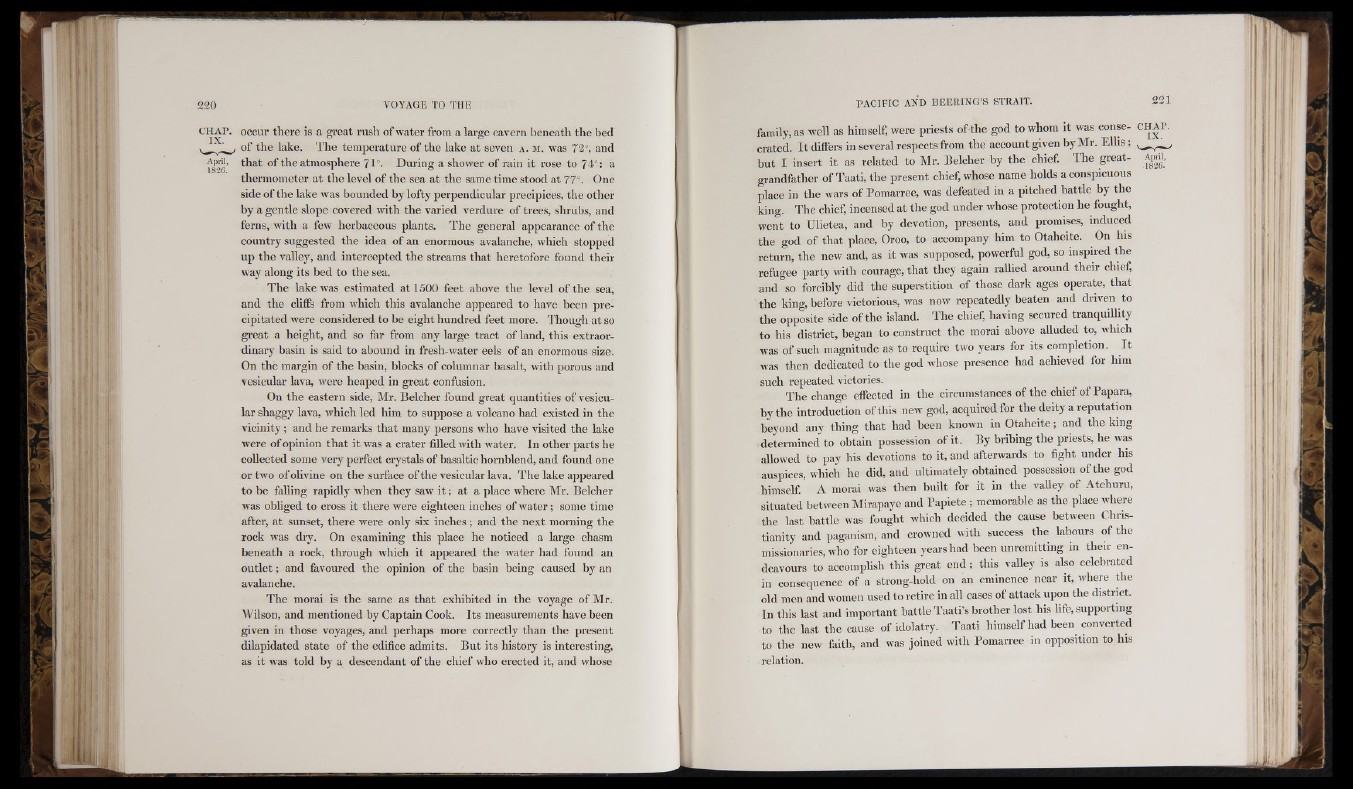
IL'I
C H A P .
IX.
April,
18 2 6 .
occur there is a great rush of water from a large cavern heneath the bed
of the lake. The temperature of the lake at seven a . m . was 72“, and
that of the atmosphere 71“. During a shower of rain it rose to 74“; a
thermometer at the level of the sea at the same time stood at 77“. One
side of the lake was bounded by lofty perpendicular precipices, the other
by a gentle slope covered with the varied verdure of trees, shrubs, and
ferns, with a few herbaceous plants. The general appearance of the
country suggested the idea of an enormous avalanche, which stopped
up the valley, and intercepted the streams that heretofore found their
way along its bed to the sea.
The lake was estimated at 1500 feet above the level of the sea,
and the cliffs from which this avalanche appeared to have been precipitated
were considered to be eight hundred feet more. 'J'hoiigh at so
great a height, and so far from any large tract of land, this extraordinary
basin is said to abound in fresh-water eels of an enormous size.
On the margin of the basin, blocks of columnar basalt, with porous and
vesicular lava, were heaped in great confusion.
On the eastern side, Mr. Belcher found great quantities of vesicular
shaggy lava, which led him to suppose a volcano had existed in the
vicinity; and he remarks that many persons who have visited the lake
were of opinion that it was a crater filled with water. In other parts he
collected some very perfect crystals of basaltic hornblend, and found one
or two of olivine on the surface of the vesicular lava. The lake appeared
to be falling rapidly when they saw i t ; at a place where Mr. Belcher
was obliged to cross it there were eighteen inches of water; some time
after, at sunset, there were only six inches ; and the next morning the
rock was dry. On examining this place he noticed a large chasm
beneath a rock, through which it appeared the water had found an
outle t; and favoured the opinion of the basin being caused by an
avalanche.
The morai is the same as that exhibited in the voyage of Mr.
Wilson, and mentioned by Captain Cook. Its measurements have been
given in those voyages, and perhaps more correctly than the present
dilapidated state of the edifice admits. But its history is interesting,
as it was told by a descendant of the chief who erected it, and whose
family, as well as himself, were priests o f the god to whom it was eonse- C H A P .
crated. It differs in several respects from the account given by Mr. Ellis; — ,
but I insert it as related to Mr. Belcher by the chief. The great- April,
grandfather of Taati, the present chief, whose name holds a conspicuous
place in the wars of Pomarree, was defeated in a pitched battle by the
king. The chief, incensed at the god under w'hose protection he fought,
went to Ulietea, and by devotion, presents, and promises, induced
the god of that place, Oroo, to accompany him to Otaheite. On his
return, the new and, as it was supposed, powerful god, so inspired the
refugee party with courage, that they again rallied around their chief,
and so forcibly did the superstition of those dark ages operate, that
the king, before victorious, was now repeatedly beaten and driven to
the opposite side of the island. The chief, having secured tranquillity
to his district, began to construct the morai above alluded to, which
was of such magnitude as to require two years for its completion. It
was then dedicated to the god whose presence had achieved for him
such repeated victories.
The change effected in the circumstances of the chief of Papara,
by the in tr o d u 7 ii of this new god, acquired for the deity a reputation
beyond any thing that had been known in Otaheite; and the king
determined to obtain possession of it. By bribing the priests, he was
allowed to pay his devotions to it, and afterwards to fight under his
auspices, which he did, and ultimately obtained possession of the god
himself. A morai was then built for it in the valley of Atehuru,
situated between Mirapaye and Papiete ; memorable as the place where
the last battle was fought which decided the cause between Christianity
and paganism, and crowned with success the labours of the
missionaries, who for eighteen years had been unremitting in their endeavours
to accomplish this great end ; this valley is also celebrated
in consequence of a strong-hold on an eminence near it, where Uie
old men and women used to retire in all cases of attack upon the district.
In this last and important b a t t l e Taati’s brother lost his lif e , supporting
to the last the cause of idolatry. Taati himself had been converted
to the new faith, and was joined with Pomarree in opposition to his
relation.